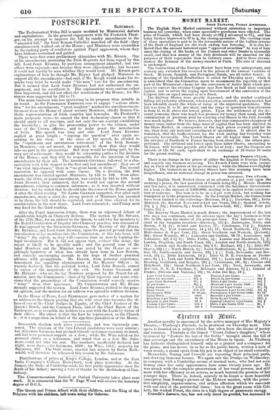POSTSCRIPT.
SS.TrarDAV.
• The Ecclesiastical Titles Bill is again modified by Ministerial defeats and capitulations. In the general engagement with Sir Frederick Thetri ger, on his attempt to improve the bill by sundry amendments to the "amended bill," the Irish Roman Catholics marched off the field—they simultaneously walked out of the House ; and Ministers were overridden by the rushing party of retaliators against Papal aggression, whom they have hitherto restrained and guided.
There were first some preliminary skirmishes with Mr. KEOGH. One of his amendments, protecting the Irish Bequests Act from repeal by this bill, Lord JOHN Russ= by previous arrangement admitted ; but two others were rejected—not because they were objectionable, but because it could not hastily be seen whither they would tend. Mr. KEOGH gave explanations of how he thought Mr. Hayter had pledged Ministers to support all the amendments—had said, if Mr. Keogh would make his re- marks very brief he would make "his men" vote for the amendment. But it seemed that Lord Joni RUSSELL had not authorized the en- gagement, and he overthrew it. The explanations were curious rather than important, and did not affect the resolutions of the House; for Mi- nisters were supported by 232 to 71. The main business was less interesting in its progress than notable in its result. As Sir FRIEDER/CH THESSIDER rose to engage "serious atten- tion" for his amendments, "great laughter" marked the simultaneous re- tirement from the House of about seventy Members, chiefly Roman Ca- tholic representatives of Irish counties and boroughs. Sir Frederick's main proposals were—to amend the first declaratory clause- so that it should apply to all rescripts, and not only the one rescript establishing the hierarchy ; to give the prosecuting power to the citizen, under veto of the Crown officers ; and to make penal the introduction of bulls. His speech was long and able. Lord JOHN RUSSELL replied at great length ; "arguing the question" over again ac- eording to his view. At the close of his speech, he alluded to the "significant and ostentatious retirement" of the Irish Roman- ist Members,—an act meant, he supposed, to show that they would take no part in the proceedings. But they would be taking part, by the very act of retirement : they would be consenting parties to the decision of the House; and they will be responsible for the insertion of these amendments by their aid. The Arromerv-GENEEAL followed in a cha- racteristic vein with respect to the first and last amendment : they are of "no vital importance," there is "no great harm in them." The second resolution he opposed with some vigour. On a division, the first amendment was carried against Ministers, by 135 to 100. Soon after- -wards, the third, or penal amendment, was carried, by 165 to 109. Lord JOHN RUSSELT. then intimated, that he would not oppose the second amendment, relating to common informers ; so it was inserted without division : but be stated that he should take the sense of the House against it after the third reading. Sir Jamas GRAHAM suggested, that after such amendments, made a- ainst the strong protest of Ministers but assented to by them, the bill should be reprinted, and good time allowed for its consideration in the new shape. Lord Joins consented; and Friday next was fixed for the third reading.
After the Papal Aggression debate, there was an adjourned debate of considerable length on Chancery Reform. The motion by Mr. STUART, of the 27th May, for an address to the Queen, to add two lay members to the Royal Commission of Inquiry into Chancery practice, was disposed of. It was opposed by the Somerron-GENERAL, the MASTER of the Rous, Mr. BErnELL, and Lord Joins RUSSELL, upon the general ground that the introduction of lay members into the Commission, at this late hour, will " delay " the report, as they will consume time in merely learning the legal vocabulary. But it did not appear that, without this delay, the report is likely to be speedily made ; and the general tone of the legal Members and the Minister was noted by the House as sur- prisingly laudatory of what has already been done in Law Reform, and &Andy encouraging enough to the hope of further practical advance with promptitude. Mr. ELLten, from personal experience, denounced the appalling abominations of the Masters' Offices : he warmly declared, that his political leader, Lord John Russell, cannot be aware of the magnitude of the evil. Sir JAMES GRAHAM and Mr. HENLEY—who are the lay Members proposed by Mr. Stuart for ad- mission into the Commission—showed by their vigorous and acute criti- cisms that the proceedings of the Commission would scarcely receive " delay " from their ignorance. Mr. CHRISTOPHER and Mr. EvaNs strongly supported the motion. Lord Joins RUSSELL yielded to the gene- ral opinion, and the motion for an address was agreed to without division.
In the House of Peers, Lord REDESDALE gave notice of a motion for an address to the Queen praying that she -will erect into baronies the of- fices of one of the Chief Judges in Equity, of the Chief Justices of the Queen's Bench, and the Common Pleas, and of the Chief Baron of the Exchequer, so as to entitle the holders to a seat with the Lords by virtue of their offices. His object is that the Law be represented, as the Church
: it is a suggestion on behalf of the appellate jurisdiction of the House.


























 Previous page
Previous page